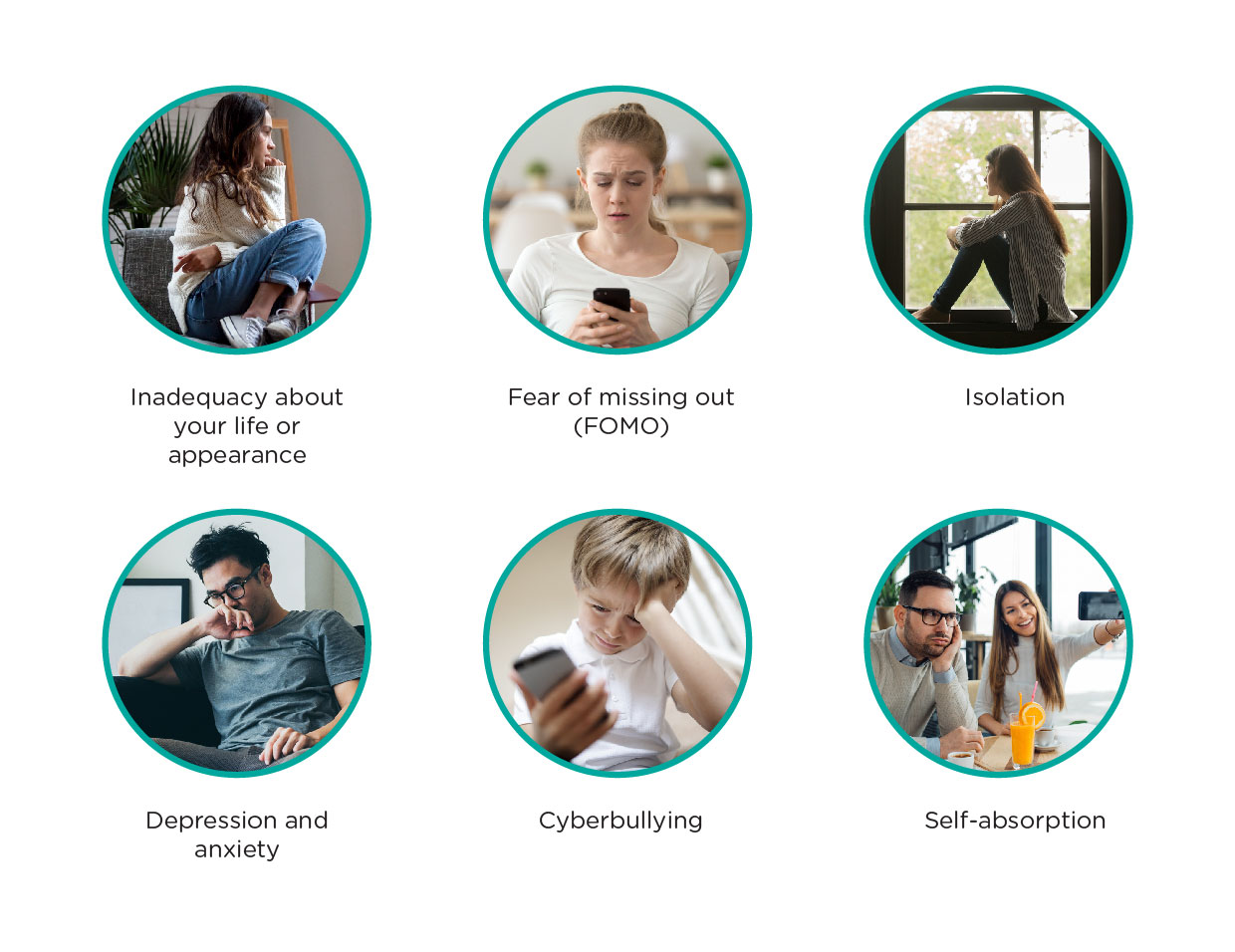
In 2020, an estimated 3.6 billion people worldwide were using social media. Of these, 2.45 billion are active Facebook monthly users. Almost 9 out of 10 (86%) people in the world aged between 18 and 29 use Facebook.

While social media can help people stay connected and support wellbeing, it can also have negative effects, particularly among young people. Several studies have found a strong link between heavy social media and an increased risk for depression, anxiety, loneliness, self-harm, and even suicidal thoughts.
The following are negative experiences that may be promoted in social media:
 Inadequacy about your life or appearance. Images on social media are often manipulated, but they can still make a young person feel insecure about how they look or what’s going on in their own life. Moreover, other people tend to share just the highlights of their lives, rarely the low points that everyone experiences. Viewing such social media posts can make young people feel envious and dissatisfied with their life.
Inadequacy about your life or appearance. Images on social media are often manipulated, but they can still make a young person feel insecure about how they look or what’s going on in their own life. Moreover, other people tend to share just the highlights of their lives, rarely the low points that everyone experiences. Viewing such social media posts can make young people feel envious and dissatisfied with their life.
Fear of missing out (FOMO). FOMO refers to “a pervasive apprehension that others might be having rewarding experiences from which one is absent” and is “characterized by the desire to stay continually connected with what others are doing.” It has been documented long before social media emerged, but sites such as Facebook and Instagram seem to intensify feelings that others are having more fun or living better lives. Linked to heavy social media use, FOMO can impact self-esteem, trigger anxiety, and fuel even greater social media use.
Isolation. A study at the University of Pennsylvania found that heavy use of Facebook, Snapchat, and Instagram increases feelings of loneliness. Conversely, the study found that reducing social media usage can actually make you feel less lonely and isolated and improve your overall wellbeing.
Depression and anxiety. Face-to-face interaction is key to mental health—just make sure you wear facemasks and face shields and maintain physical distancing. Prioritizing social media interaction over in-person relationships increases a person’s risk for developing or aggravating anxiety and depression.
Cyberbullying. About 10 percent of teens report being bullied on social media and many other users are subjected to offensive comments. Social media platforms can be hotspots for spreading hurtful rumors, lies, and abuse.
Self-absorption. Sharing endless selfies and your innermost thoughts on social media can create an unhealthy self-centeredness and distance you from real-life connections.
If you feel overwhelmed and need help or just want to talk to someone about your mental health problems, call the 24/7 NCMH Hotline at (0917) 899-8727 and (02) 8-989-8727.
References: https://www.statista.com/statistics/278414/number-of-worldwide-social-network-users/#:~:text=In%202020%2C%20an%20estimated%203.6,almost%204.41%20billion%20in%202025.&text=Social%20network%20penetration%20is%20constantly,2020%20stood%20at%2049%20percent. Accessed 10 September 2020 https://khoros.com/resources/social-media-demographics-guide. Accessed 10 September 2020 https://www.centreformentalhealth.org.uk/blogs/anxiety-loneliness-and-fear-missing-out-impact-social-media-young-peoples-mental-health#:~:text=The%20rise%20of%20social%20media,with%20anxiety%2C%20loneliness%20and%20depression. Accessed 10 September 2020 https://www.helpguide.org/articles/mental-health/social-media-and-mental-health.htm. Accessed 10 September 2020
Overweight and obesity are defined as abnormal or excessive fat accumulation that presents a risk to health. A body mass […]
Around 27 million Filipino adults are overweight or obese, according to the latest National Nutrition Survey conducted by the Food […]
Advances in scientific and technological knowledge have provided unprecedented advantages in terms of immeasurable convenience in our daily living, lightning-fast […]